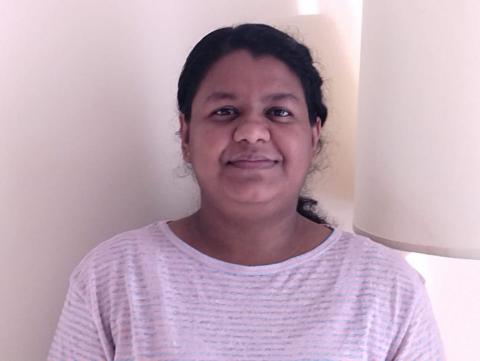Toxic Chemicals and Women’s Health in Sri Lanka

Chalani Rubesinghe is the Project Planning and Management Officer at the Center for Environmental Justice in Sri Lanka. She completed her Masters degree in environmental science and is author of "Save Environment, Save the Planet."
I have been working on the impact of chemicals exposure on women’s health ever since I joined the Centre for Environmental Justice, Sri Lanka in 2012. Starting as an environmental officer through my journey to project planning and management officer, I have worked with IPEN on various initiatives.
Evidence-based advocacy is one of the core areas of CEJ that I focused on. Our work to expose the use of lead in paint was one of the most successful campaigns that I was a part of. This initiative was started by Toxics Link and IPEN and resulted in national lead paint legislation and changes in the paint market. In this effort I created a platform to bridge communication between the scientific community and the general public through a magazine launched by CEJ: The Chemical Watch which communicates research findings in simple language.
I also regularly participate with decision-makers in various advocacy dialogues to protect the environment and human health. I enjoy the innocent pleasure of being a worthy citizen contributing to making a better world for the future generations.
Exposure to hazardous and toxic chemicals has become a very common scenario in the world today. Persistent Organic Pollutants (POPs), Persistent, Bio-accumulative and Toxic Chemicals (PBTs), vPvBs (very Persistent and very Bio-accumulative) chemicals, Highly Hazardous Pesticides (HHPs), and Endocrine Disrupting Chemicals (EDCs) are among the most widespread groups of toxic chemicals.
In the patriarchal society, women are often blamed for infertility, low immunity, and giving birth to sick children, even in circumstances that women do not control. The hidden culprit of toxic chemicals comes with consumer goods, food, air, or water. Yes! We can ignore chemical exposure no more! A woman living in the vicinity of agricultural land and helping her husband along with their children are exposed to chemicals that can disrupt their health. Women can play a vital role in reducing exposure to harmful chemicals for themselves as well as for their families and surroundings.
Studies around the world continue to find EDCs in cosmetics, plastic products, thermal paper bills, erasers, and many other consumer items that women handle daily. One source of such toxic and hazardous compounds is plastic containers. The WWF’s report on Plastics: The Costs to Society, the Environment and the Economy reveals that plastics can carry more than 170 fracking chemicals that are known to cause human health problems, including cancer and neurotoxicity. It further stipulates that open burning of synthetic plastic polymers like polyvinyl chloride (PVC) produces dioxins and related compounds and at least 30 of these compounds can potentially damage the brain and disrupt hormones. Open burning of plastic products can pose serious health threats to humans, especially women. Due to their different biological and physiological makeup, the same level of exposure can be more damaging to women than to men. Reports say this is due to the proportionately high amount of body fat in women they store more environmental pollutants in their tissues than men. Highly hazardous active ingredients hidden among household pest control substances are another culprit behind malfunctioning hormones due to their endocrine disrupting nature. Exposure to pesticides among women may result in miscarriages, premature births, birth defects, and low birth weight.
A woman as the centre of the family unit makes choices for her children and family. Therefore, it is important that she is well aware of the sources of these toxic chemicals and exposure pathways, while the policymakers work on systems to ban/reduce and control them.
In Fact, women have a bigger role in preventing and eliminating the sources and exposure to toxic chemicals by paying attention to the choices they make for themselves and their families. Therefore, educating women to stand with activists against corporations and corrupted systems that encourage the production and distribution of toxins is highly necessary.
